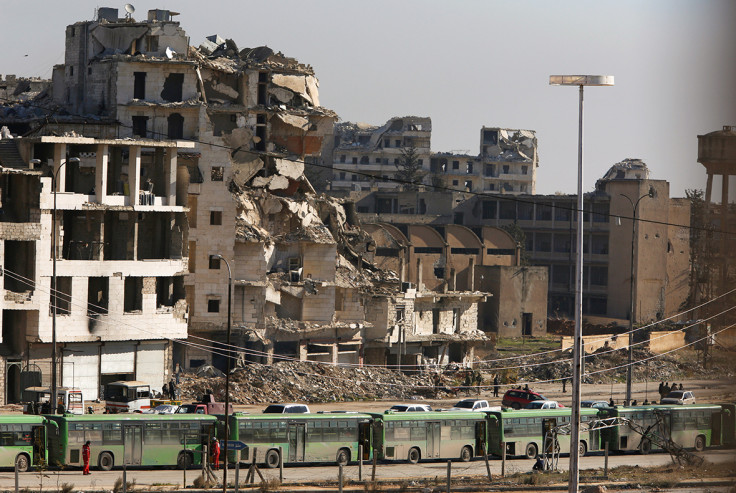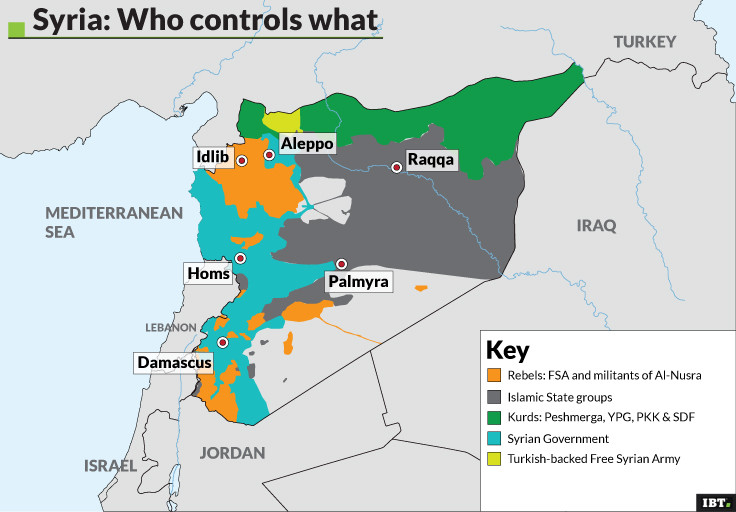Russia, Iran and Turkey support negotiations in Syrian conflict as Aleppo evacuation continues
The rebels remaining in Aleppo were told to leave 'as soon as possible' by the Syrian forces and their allies.
Russia, Iran and Turkey reached an agreement on 20 December to act as guarantors in negotiations between the government of Bashar al-Assad and the opposition in Syria, as the evacuation of fighters and civilians from rebel-held eastern Aleppo continues.
Russian foreign minister Sergey Lavrov told reporters in Moscow that representatives of the three countries had signed a joint declaration, stating: "Iran, Russia and Turkey express the readiness to promote the drafting of the agreement the Syrian government and the opposition are negotiating at the moment and to act as its guarantors."
The meeting, which Lavrov called "the most effective" format to tackling the crisis, visibly excluded the United States and confirmed Turkey as the main international stakeholder of the anti-Assad front, while Russia and Iran remain Assad's most influential allies.
Russia and Turkey relations were the indirect target of the assassination of the Russian ambassador to Turkey in the city of Ankara on 19 December.
The shooter, a Turkish off-duty police officer, shouted "Don't forget Aleppo! Don't forget Syria!" after killing the ambassador, in a reference to Russia's military support of Assad's offensive on rebel-held eastern Aleppo.
The rebels in the remaining anti-government enclave in Aleppo were reportedly warned to leave "as soon as possible" by the Syrian forces and their allies on 20 December.
A Syrian military source told the French news agency AFP that the army was expected to enter the rebel enclave "to clean the area after the fighters leave". The source said the soldiers had "issued a call over megaphones to the remaining fighters and civilians who want to leave, to exit the eastern districts". The Iran-backed Lebanese militant group Hezbollah, which is fighting alongside the Syrian army, also shared similar messages through the organisation's media arm, reported the Associated Press.

Russia's Lavrov said that the evacuations could continue for another one or two days, and the Turkish Foreign Ministry said they aim to complete the evacuations by 21 December. The ministry estimated that 37,500 people have been evacuated so far.
Russia and Turkey were the main negotiators of a series of ceasefires meant to ensure the evacuation of civilians and fighters from the besieged eastern part of Aleppo. The evacuations were interrupted at times by eruptions of violence, including the shooting of a convoy on 15 December, which was blamed on pro-Assad forces, and the torching of five evacuation busses on 18 December, for which the rebels were responsible.
The International Committee of the Red Cross, which has overseen the evacuations since the ceasefire was brokered between Russia and Turkey, said around 15,000 have left on 19 December alone. A resolution was passed unanimously at the UN Security Council on 19 December allowing for international observers to monitor the evacuation.
The recapturing of Aleppo from anti-government forces represents Assad's biggest victory since the civil war began in 2011, but even if the regime now controls four of the main cities in Syria, only about a third of the country is under government control.

Rebel factions still control the north-western Idlib province and pockets of territory elsewhere in the country, while the Islamic State group rules a large swath of the north-east and has recently reconquered the ancient city of Palmyra.
© Copyright IBTimes 2025. All rights reserved.






















